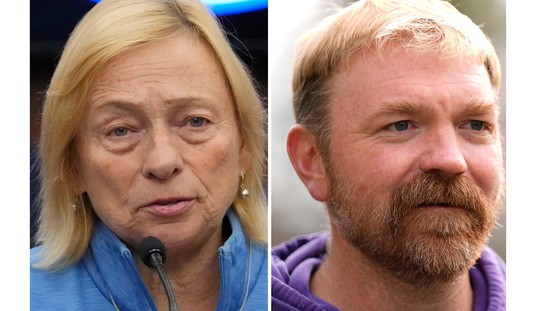When you’ve lost the leader of the Death Eaters … Or for that matter, Almásy from The English Patient. Six of one, half-dozen of the other, I suppose. Ralph Fiennes’ position within the Harry Potter universe has given him a ringside seat to the cancel culture’s treatment of creator JK Rowling, and Fiennes tells the Telegraph that the vitriol is incomprehensible and “disturbing.”
What happened to artistic freedom, Fiennes wonders, as well as free debate. And where does all the canceling end — with suppression of any dissent?
Of course, Fiennes’s position at the front-line of the arts could be hazardous, as the culture wars with their fast judgments and attempted cancellations intensify. He offers up particular despair at the treatment meted out to JK Rowling in the wake of her engagement with trans issues. “I can’t understand the vitriol directed at her. I can understand the heat of an argument, but I find this age of accusation and the need to condemn irrational. I find the level of hatred that people express about views that differ from theirs, and the violence of language towards others, disturbing.”
He also offers me a keenly felt defence of artistic freedom, in the theatre and elsewhere. “I get worried if it’s decided that certain classical plays are irrelevant. I think often there’s a superficial reading – Restoration drama is ‘colonialist, hierarchical, quasi racist’. But they’re just plays. You can turn them on their head. The danger is of labelling stuff. These texts are there – so pull the humanity out of them, pull out the stuff that’s relevant. If you’re going ‘it doesn’t tick these boxes’, you’re lowering the portcullis of judgement before you’ve even got into the room with it. I think that’s troubling.”
He praises artistic free-spirits from other disciplines – citing Picasso and Henry Miller. “We need to have those voices that risk being offensive. How sad if we sat on any expressive voice that could shake the scenery, that could get inside us and make us angry and turn us on. I would hate a world where the freedom of that kind of voice is stifled.”
The Daily Wire provides the backstory on Rowling’s cancelations by social-media warriors. Her main sin has to do with her pushback on transgenderism, which she sees as a threat to feminism and women’s rights by making biological sex irrelevant. Rowling has refused to back down, and she told Good Housekeeping in December that her positions get plenty of support — even if people are otherwise afraid to speak out publicly:
“Many women are concerned about the challenges to their fundamental rights posed by certain aspects of gender identity ideology,” the author said. “I’ve had a huge postbag since speaking up on this issue and more than 90 per cent of the letters and emails have been supportive. My correspondents have included medical staff, social workers, prison workers, workers in women’s refuges and members of the LGBT community, including trans people.”
“Many are afraid to speak up because they fear for their jobs and even for their personal safety,” she continued. “This climate of fear serves nobody well, least of all trans people. I believe everybody should be free to live a life that is authentic to them, and that they should be safe to do so. I also believe that we need a more nuanced conversation around women’s rights and around the huge increase in numbers of girls and young women who are seeking to transition. Some of the most heartbreaking letters I’ve received have been from young women who regret the irreversible surgeries they’ve undertaken. These stories need to be told.”
Rowling’s pushback is clearly more specific. Fiennes’ is more philosophical, and in that sense much more powerful. One does not need to agree with Rowling’s position to call out those who want her silenced. Indeed, Fiennes never actually comments on the controversy itself, but instead on the “vitriol” and “hatred” of the responses directed at her for voicing her position.
Given Fiennes’ visibly iconic part of popular culture, this is a welcome addition to the pushback against the “age of accusation and the need to condemn.” The more people speak up against the vitriol and hate aimed at those who dare to question popular culture’s consensuses-of-the-moment, the more those will matter less and less, and the less power social-media bullies will have. Perhaps it takes He Who Shall Not Be Named to break the cancel-culture spell, or at least we can hope it advances the cause significantly.








Join the conversation as a VIP Member